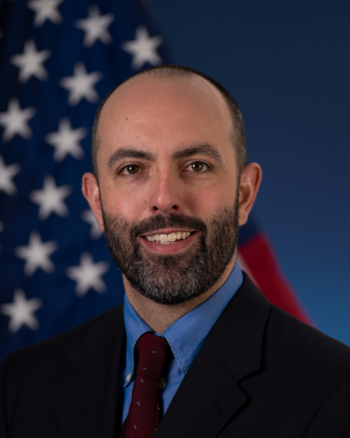Breakthrough Materials for Compact RF Front-end Filters
Virtual presentation by Dr. Benjamin Griffin from DARPA
Abstract:
Wideband digital active electronically scanned array systems require protection at each element against RF interference to avoid saturation of components. Such protection is offered by high performance RF filters of physical dimension that fit within the elemental spacing of the array. The COmpact Front-end Filters at the ElEment-level (COFFEE) program leverages material breakthroughs to create compact RF filters of differentiating device performance. Through COFFEE, new advances in dipole engineering of piezoelectric thin films while controlling crystallinity and composition have led to acoustic resonators, a fundamental building block of filters, with record breaking coupling coefficients and quality factors at 18 GHz and 50 GHz. Moreover, simulations of new magnetostatic filter designs enabled by newly developed ferrite processing and integration show state-of-the-art tunability in the range of 2‑18 GHz and 45‑50 GHz. COFFEE’s material developments are complemented by circuit-based approaches such as N-path and evanescent cavity filters. The diverse approaches within the COFFEE program are fighting physics against physics to determine the most promising technologies for the next generation of compact, high frequency filters with low loss and high-power handling.
Date and Time
Location
Hosts
Registration
-
 Add Event to Calendar
Add Event to Calendar
Loading virtual attendance info...
- Contact Event Host
-
Jeronimo Segovia-Fernandez
Chair, IEEE MEMS & Sensors SFBA Chapter
- Starts 03 April 2023 05:21 PM UTC
- Ends 27 April 2023 02:00 AM UTC
- No Admission Charge
- Menu: IEEE Member, Non-IEEE Member
Speakers
 Dr. Benjamin Griffin
Dr. Benjamin Griffin
Biography:
Dr. Benjamin Griffin joined DARPA in October 2018 as a program manager in the Microsystems Technology Office (MTO). His research interests include MicroElectroMechanical Systems (MEMS), unattended sensors, sensors and electronics for aerospace applications, materials and devices hardened to operate in harsh environments, and RF resonators and filters. Prior to joining DARPA, Dr. Griffin was a principal member of technical staff in the MEMS technologies department at Sandia National Laboratories. At Sandia, he led research programs in the area of MEMS sensors, actuators, and resonators with a focus on aluminum nitride (AlN)-based piezoelectric devices and next-generation piezoelectric materials, such as scandium aluminum nitride (ScAlN). Preceding his position at Sandia, Dr. Griffin spent more than two years with the Interdisciplinary Consulting Corporation, developing sensing technologies for aerospace applications. Dr. Griffin received his Bachelor of Science and Master of Science degrees in aerospace engineering, and his Doctorate of Philosophy degree in mechanical engineering from the University of Florida (UF). His graduate research was in the area of AlN piezoelectric micromachined ultrasonic transducers (PMUTs) for nonlinear acoustic applications. He was also a National Science Foundation graduate research fellow at UF.
Agenda
6:30 – 6:50 PM Registration & Networking
6:50 – 7 PM Announcements
7:00 – 7:45 PM Invited Talk
7:45 – 8:00 PM Questions & Answers

